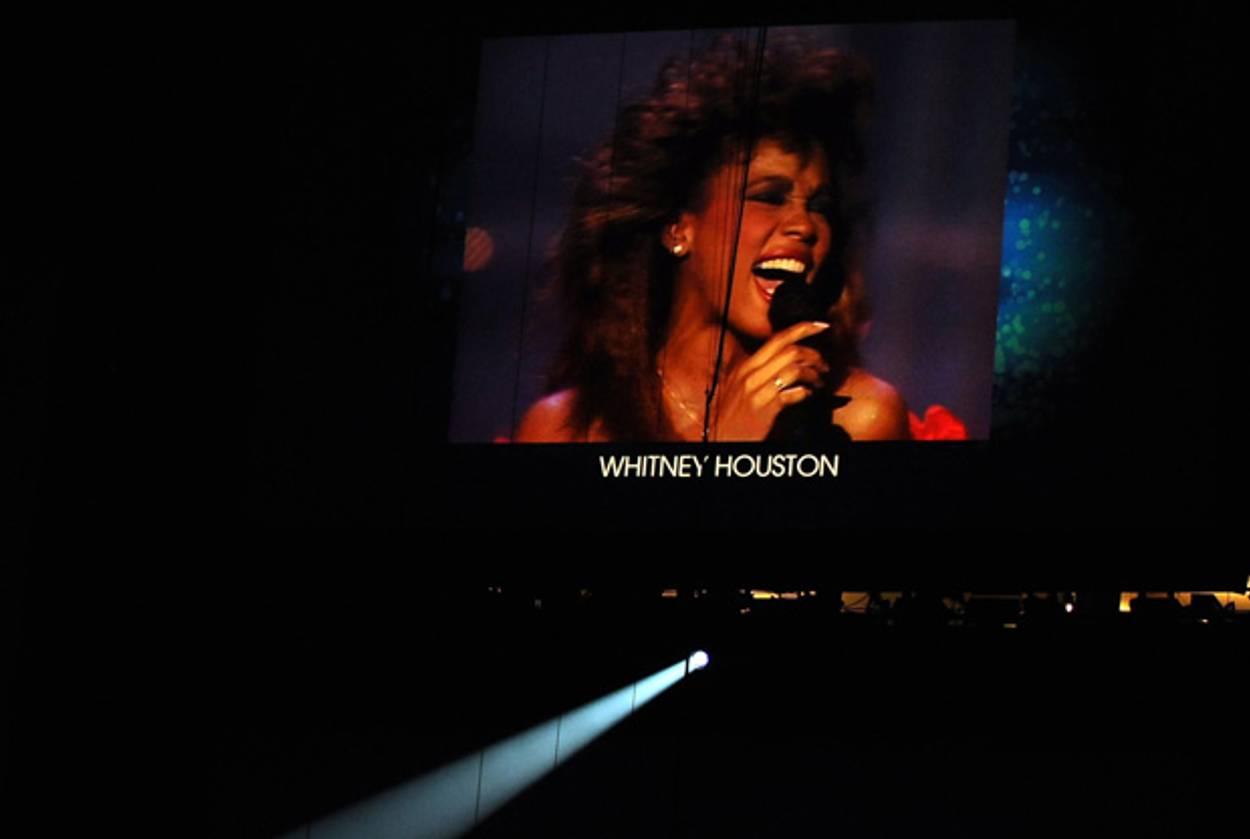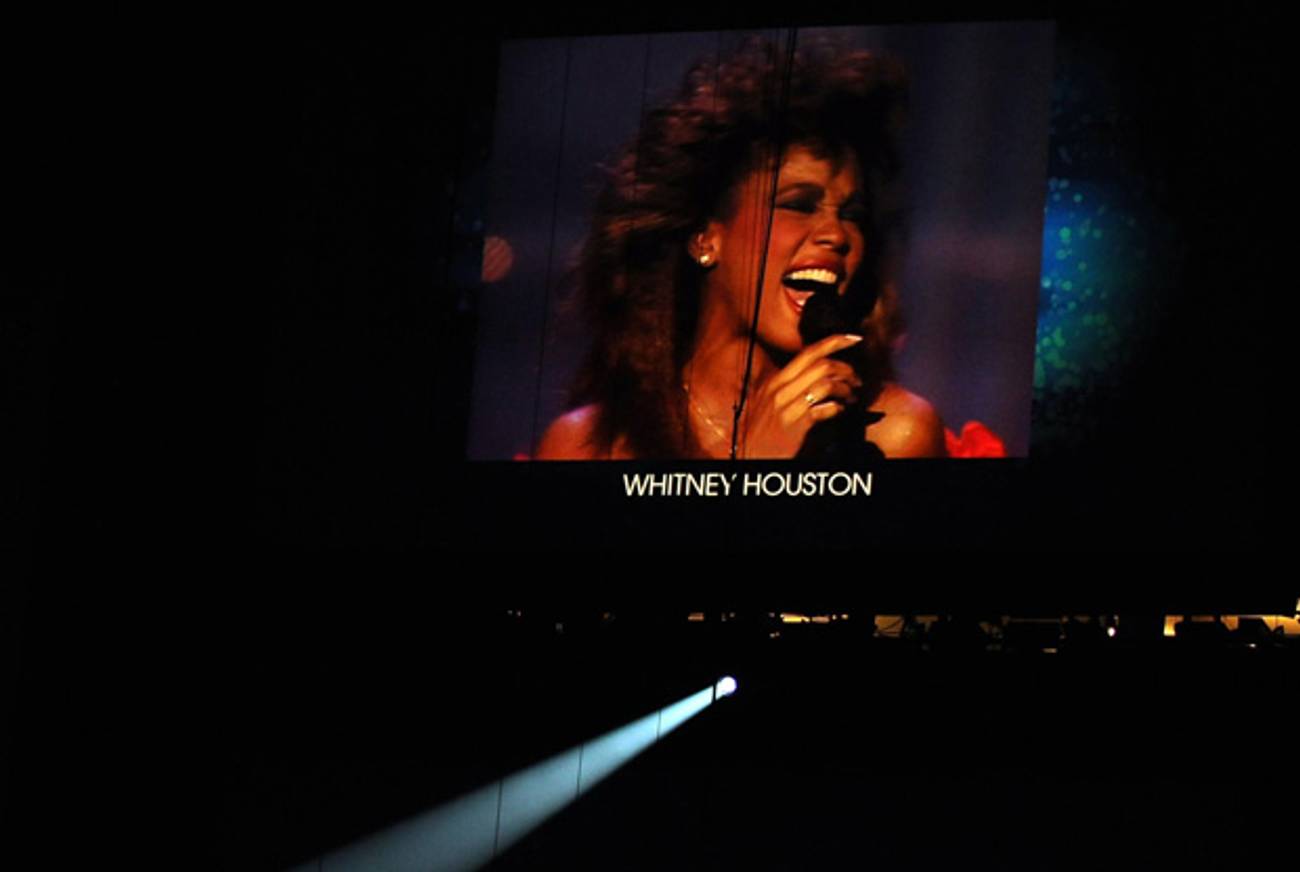Mourning in America
The awkward tribute to the late Whitney Houston at the Grammys proves that the country still hasn’t learned how to mourn properly. But Judaism has.




“There’s no way around this,” said LL Cool J as he took the stage to host the Grammys last weekend. “We’ve had a death in our family. And so at least for me, me, the only thing that feels right is to begin with a prayer for a woman who we loved, for our fallen sister, Whitney Houston.”
And on he went, thanking the heavenly father for the blessing of Houston’s honeyed voice and sending condolences to the late singer’s mother and daughter. Cool J was earnest—not a sentiment he comes by easily—but the moment, at least on television, came off as a dud. Maybe it was because no eulogist can truly touch hearts while wearing a Kangol cap. Maybe it was because the speech was accompanied by a panning shot of the audience, and what you actually saw when Cool J spoke was Lady Gaga’s colander costume or Paul McCartney’s face, looking as lively as Lenin’s after two decades in embalming fluid. Either way, Cool J’s words fell flat, as did those of most other musicians who name-checked Houston throughout the ceremony. By the time Stevie Wonder looked up and addressed Whitney in heaven, every bit of sweet remorse one might have felt for Houston had dissipated.
It’s easy to accuse the music industry for being incapable of conveying solemn sentiments—these, after all, are the people responsible for Lana Del Rey—but the problem is bigger than that: Our culture is mourning averse. The only method we seem to have for collectively processing loss is the Academy Awards’ In Memoriam model, namely showcasing the dead at their prime, beautiful and radiant and eternal. Immediately after Cool J concluded his impromptu prayer, enormous screens came down, and up popped Houston, performing at the Grammys a decade earlier, draped in white, singing her classic hit “I Will Always Love You.”
It was intended as a tribute, but it left a bitter taste. Houston was freshly deceased, and yet there she was, present and in her prime, and there we were, her fans, able to cling to denial for just a moment longer. We, after all, were watching the whole thing unfold on television; for us, past Whitney and present Whitney, Houston alive and Houston dead, were one.
It’s the same routine every time a celebrity passes away, particularly if he or she is young and troubled. We are genuinely shocked and truly saddened, yet we lack the emotional and spiritual vocabulary to process our pain.
Not so Rabbi Joseph Soloveitchik. While we usually think Judaism’s chief edict when it comes to grieving is shiva—the communal congregation at the home of the deceased for the benefit of the surviving family—the eminent Orthodox thinker reminds us that Jewish bereavement has two stages. Before we get to aveilut, or mourning, we have to go through aninut, or acute mourning, the period between first receiving the bad news and completing the funeral rites.
“Aninut,” Soloveitchik writes, “represents the spontaneous human reaction to death. It is an outcry, a shout, or a howl of grisly horror and disgust. Man responds to his defeat at the hands of death with total resignation and with an all-consuming masochistic, self-devastating black despair. Beaten by the friend, his prayers rejected, enveloped by a hideous darkness, forsaken and lonely, man begins to question his own human singular reality.” If our loved one can just die like that, we tell ourselves in our darkest hour, then surely life isn’t much more than an empty and meaningless swirl in time, and surely human life is just as devoid of purpose as that of cattle or cats.
Such mad sorrow, Judaism teaches us, such impotent rage, is not only permissible but normal, which is why mourners during the period of aninut are exempt from most mitzvot. Judaism understands that it takes us time to process the most unnatural fact of another human being having forever disappeared and therefore suggests that we focus only on the practical arrangements of burial and leave the emotional stuff for later, when we’ve had a chance to absorb the blow. To that end, friends and family members are discouraged from offering their condolences until the deceased is buried. “Do not console a person whose deceased relative lies before him,” Pirkei Avot, the compilation of rabbinical wisdom and teachings, commands us. Cool J should’ve listened.
But Cool J, of course, was mourning not in private but on TV, his words broadcast and tweeted in real time and recounted on scores of blogs. And he was speaking a day after Houston’s demise, by which time the pop legend had been the subject of hundreds of tributes and obituaries on the Internet. We socially mediated moderns have no time for aninut. Death excites us to comment, publicly and immediately, even if what we have to say is not a howl of horror but a muted murmur, drained of warmth and meaning. Hence Cool J and Wonder and Alicia Keys and the rest, well-intentioned but uninspired. Hence the torrent of status updates on Facebook immediately after Houston’s death was announced. We’re permitted neither the time to mourn nor the freedom to mourn passionately, impolitely, savagely. We’re expected to say something about God and heaven, to watch the deceased sing a song or smile widely on some bit of archival footage, and then move on. But life doesn’t work that way. And each time a famous person dies, we begin again, baffled and strained.
So, until we can figure out how to speak about Whitney Houston’s death with distance and depth and insight, let us observe this period of aninut and say nothing more.
Liel Leibovitz is a senior writer for Tablet Magazine and a host of the Unorthodox podcast.
Liel Leibovitz is editor-at-large for Tablet Magazine and a host of its weekly culture podcast Unorthodox and daily Talmud podcast Take One. He is the editor of Zionism: The Tablet Guide.